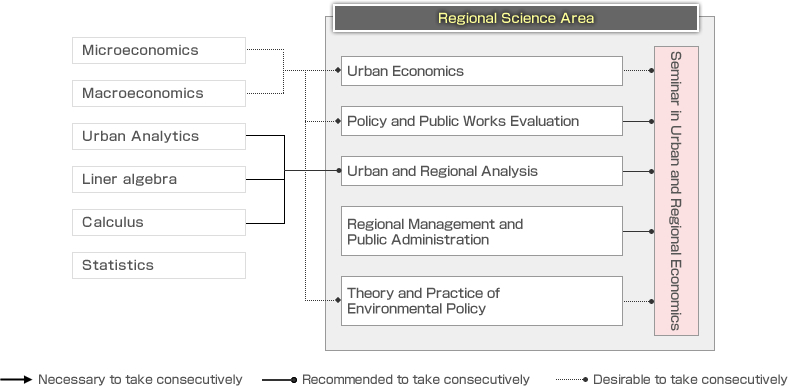Regional Science Area
In the Regional Science area, students acquire scientific analysis techniques using mathematical and economic methods for cities, regions, and environments. They learn the basics of the theories needed for policy proposals to address various problems in society. This area consists of the following 5 lecture-based courses and [Seminar in Urban and Regional Economics ]:
| Course name | Course description | Target year/years |
|---|---|---|
| Seminar in Urban and Regional Economics | In this course, students will perform empirical analysis using urban, regional, and environmental economic methods, themes, and data to acquire viewpoints and techniques for analyzing policy issues. | 3 – 4 |
| Urban Economics | In this course, students will learn the basics of analysis methods in urban economics and location theory, and acquire knowledge of policies on urban, regional, and international trading. | 2 – 4 |
| Regional Management and Public Administration | In this course, students will acquire abilities to determine, implement, and evaluate public policies, and discuss appropriate future urban/regional revitalization by studying some example cases of national land planning, housing, and urban area policies, with recent new global trends related to changes in public policies and leaders and differences from Western countries considered. | 2 – 4 |
| Policy and Public Works Evaluation | This course will explain: the current status of policy evaluation, specifically in cities, regions, and lands; and economic analysis (cost-benefit analysis), financial analysis, and finance related to projects, specifically social capital development projects. | 2 – 4 (recommended in 2nd-year) |
| Urban and Regional Analysis | Abstracted from a certain point of view, cities may be regarded as patterns of dots, lines, and surfaces. This course will discuss the mathematical basis needed for analyzing these patterns in terms of urban functions. | 2 – 4 |
| Theory and Practice of Environmental Policy * | In this course, students will observe policy measures for environmental conservation and methods for their evaluation mainly from economic perspectives. They will also examine the relationships between various values/disciplines and policy implications to develop diverse perspectives on “environmental problems” and “environmental policies”. Furthermore, they will deepen their understanding of specific environmental issues, such as global warming and waste. | 2 – 4 |
*: Provided by collaborative staff (from the College of International Studies)




